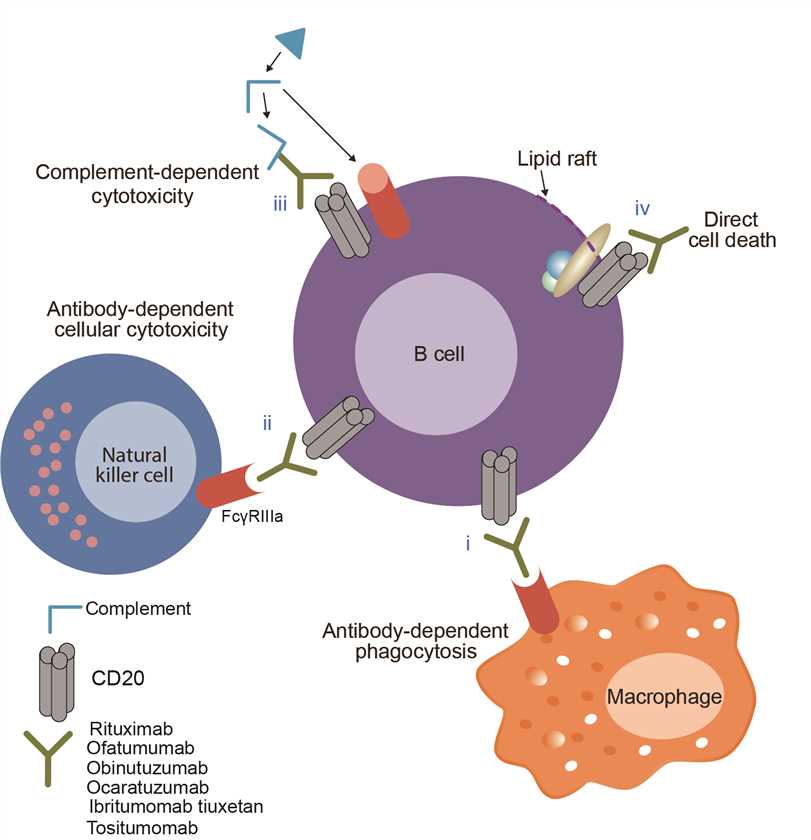Ocaratuzumab Overview
Introduction of Ocaratuzumab
Ocaratuzumab, previously known as AME-133v, is a humanized IgG1 type monoclonal antibody targeted at CD20 antigen, which is expressed on B-lymphocytes. Ocaratuzumab is a novel Fc-engineered monoclonal antibody designed in an attempt to induce effective antibody-dependent cell-mediated cytotoxicity (ADCC) at very low concentrations that may facilitate sub-cutaneous dosing. Libraries of antibody Fab fragment regions were generated with codon substituted variations of the antibody complementarity determining regions (CDRs) inserted into human antibody light and heavy chain germline frameworks. Then, the researchers expressed and selected mutants based on increased affinity for CD20. A variable region with increased binding activity for CD20 was selected and developed as ocaratuzumab. This drug is currently being developed and has been investigated in the trial for the treatment of cancer and autoimmune disorders. The pre-clinical trials of ocaratuzumab in follicular lymphoma was conducted in the United States (US) and Japan in phase I/II, and a Phase I trial was conducted in US rheumatoid arthritis patients. In addition, a phase III trial in relapsed follicular lymphoma patients is underway. Compared to rituximab, ocaratuzumab was shown to ocaratuzumab was shown to have 13 to 20 fold greater affinity for CD20 and 6 fold more potent ADCC in pre-clinical studies. The use of ocaratuzumab in other oncology and rheumatology indications has also been developed.
Mechanism of Ocaratuzumab
Ocaratuzumab is designed to bind to human CD20 molecular with potential antineoplastic activity. CD20, composed of four homologous oligomers, is a unique transmembrane protein on the B cell membrane, which is involved in the influx of calcium ions activated by B cell receptor (BCR). CD20 is expressed in more than 95% of B-cell lymphomas, but not in hematopoietic stem cells, plasma cells, and other normal tissues. The CD20 antigen is a kind of tumor marker. When CD20 on the surface of B cell binds to the monoclonal antibody, there is no obvious internalization and exfoliation. Therefore, CD20 is an ideal target antigen for the treatment of B cell lymphoma with monoclonal antibody. In the treatment of B cell lymphoma with anti CD20 monoclonal antibody, plasma cell function was not affected, and two kinds of immunoglobulinemia were not induced, and B cell differentiation and development were not affected at the same time. Though specifically binding with CD20, ocaratuzumab inhibit the proliferation and the differentiation of B cells, and promote antibody-dependent cell-mediated cytotoxicity (ADCC) and apoptosis of B cells expressing CD20. This monoclonal antibody can induce an augmentation of the anti-tumor immune response because its Fc portion has been designed to have a higher binding affinity for variant Fc receptors on T helper cells. Because of its Fc engineering, ocaratuzumab may be significantly more potent than rituximab in inducing B cell-directed ADCC.

Fig.1 Mechanism of action of ocaratuzumab
For research use only. Not intended for any clinical use.
This site is protected by reCAPTCHA and the Google Privacy Policy and Terms of Service apply.



